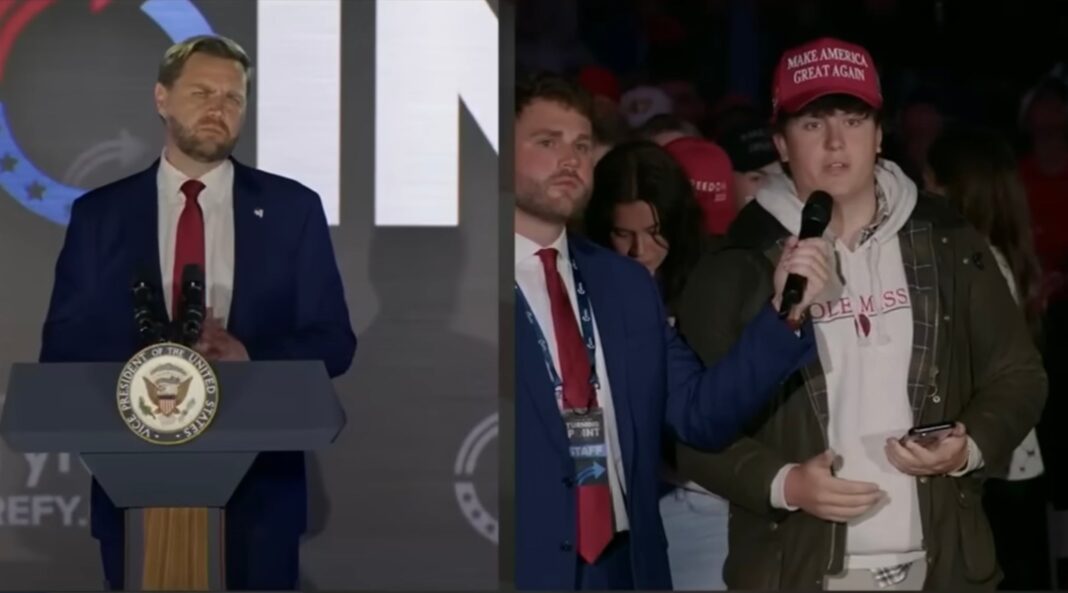Sure! Here’s an article structure based on the provided content, focusing on key aspects of the event featuring Vice President JD Vance and student reactions regarding U.S. support for Israel.
Vice President JD Vance Faces Skepticism on U.S. Support for Israel at Ole Miss
Emerging Concerns Among Young Conservatives
At a recent Turning Point USA event at the University of Mississippi, Vice President JD Vance encountered pointed questions from an audience of conservative college students, reflecting a notable shift in the traditional support for Israel within the Republican Party. Since the Gaza war escalated on October 7, younger conservatives have started to voice doubts about the longstanding U.S. backing of Israel — a cornerstone of GOP ideology.
Challenging Questions from the Audience
Vance’s presentation quickly became a forum for skepticism. One student, donning a MAGA hat, openly questioned the necessity of the U.S. supporting Israel, framing it within a larger context of perceived injustices against Palestinians. “Why do we owe Israel something?” he asked, expressing confusion about what he termed “ethnic cleansing in Gaza,” a reference to a controversial perspective on the actions taken during the conflict. This student, like others in the audience, articulated a growing discontent that resonates with a segment of the MAGA movement, indicating a deeper ideological divide.
Context of Antisemitism and the Need for Clear Stances
Vance faced significant criticism not only for his responses but for his perceived failure to unequivocally address antisemitism. In light of recent discussions within social circles of young conservatives — including a startling group chat among Young Republican leaders joking about Hitler — Vance’s lack of a clear condemnation of antisemitism drew ire from Jewish conservatives. Critics highlighted his missed opportunities to set a moral example during a time of rising antisemitic sentiment.
Referencing Charlie Kirk and Shifting Allegiances
The conversation echoed sentiments previously voiced by Charlie Kirk, the founder of TPUSA, whose legacy regarding support for Israel has come under scrutiny. His name was invoked several times, showcasing the internal debate among conservatives about U.S. foreign policy and donations from pro-Israel figures like Miriam Adelson. One audience member questioned the implications of Adelson’s financial support for political candidates, plaguing the discourse with concerns about potential conflicts of interest.
America-First Ideology in Foreign Relations
Vance’s responses framed his perspective in an America-first ideology, suggesting that while alliances with other nations like Israel are necessary, they should be based on shared interests. He stated, “Sometimes, they have similar interests to the United States, and we’re going to work with them in that case.” This nuanced position attempts to balance traditional support for Israel with an emerging preference for prioritizing American interests.
The Question of Presidential Influence
During the Q&A, Vance addressed claims that Israel wields undue influence over U.S. presidents. He asserted that while mutual interests exist, the current administration does not operate under any form of manipulation by Israel. This remark, however, resonated with conspiracy theories surrounding Jewish control and elicited backlash from critics who felt it reinforced harmful stereotypes.
Navigating Differences Among Religions
As the conversation wound through religious complexities, Vance noted that disagreements between Judaism and Christianity are natural, advocating for open dialogue. He highlighted a personal commitment to protecting Christian sites in Israel, indicating an attempt to bridge gaps while also signaling to his audience the importance of faith-based alliances.
Reflecting on the Impact of the Current Administration
Vance praised former President Trump’s approach towards Israel and claimed Trump successfully applied leverage that previous Democratic administrations had not. This perspective underscored a narrative among right-wing circles that challenges the traditional view of Israeli influence in Washington, presenting a shift within conservative thought.
Responses to Allegations of Ethnic Cleansing
Despite the critical questions surrounding Israel’s actions, Vance’s reluctance to directly engage with accusations of ethnic cleansing drew criticism. Such topics not only ignite passionate discussions but also reflect broader concerns about the resurgence of antisemitic narratives within certain factions of the Republican Party.
A Broader Conservative Movement in Flux
Vance’s views are indicative of a broader trend in the Republican Party, where divisions are increasingly apparent on foreign policy issues, particularly regarding Israel. His remarks and the backlash they received illustrated a pivotal moment within conservative circles as younger factions rethink foundational beliefs about allegiance and intervention.
This article captures the essence of the event and the surrounding discourse, emphasizing the complexities and evolving conversations within American conservatism regarding support for Israel.



